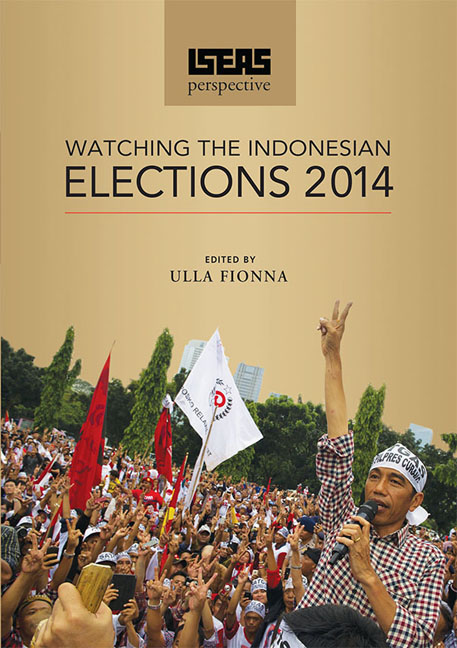Book contents
- Frontmatter
- Contents
- Foreword
- Introduction
- 1 The Gubernatorial Race in Jakarta: Background and Implications
- 2 Indonesian Parties Struggle for Electability
- 3 Who Will Be Indonesian President in 2014?
- 4 Indonesian Presidential Election Forcing Rejuvenation of Parties
- 5 Resisting Democracy: Front Pembela Islam and Indonesia's 2014 Elections
- 6 Getting to Know the Contestants of the 2014 Indonesian Parliamentary Elections
- 7 A Snapshot of the Campaigning in Indonesia's 2014 Legislative Elections
- 8 Unpacking the Results of the 2014 Indonesian Legislative Elections
- 9 Indonesia's 2014 Legislative Elections: The Dilemmas of “Elektabilitas” Politics
- 10 The Islamic Factor in the 2014 Indonesian Elections
- 11 Vote-buying in Indonesia's 2014 Elections: The Other Side of the Coin
- 12 Gap Narrows Between Candidates in Indonesian Presidential Elections
- 13 Analysing the Economic Platforms in the Indonesian Presidential Election
- 14 Indonesian Islamic Parties After the 2014 Elections: Divided and Self-Centred
- 15 Safeguarding Indonesia's Pluralism: An Essential Task for Joko Widodo
- 16 Jokowi's Key Economic Challenge: Improving Fiscal Policy for Equitable Growth
- 17 Crossing the River While Avoiding the Stones: Jokowi's Run-up to the Presidency
- 18 Post-elections Indonesia: Towards a Crisis of Government?
- Epilogue: Jokowi's First Months: Compromise Cabinet, Subsidy Cuts, and Corrupt Coalition
5 - Resisting Democracy: Front Pembela Islam and Indonesia's 2014 Elections
Published online by Cambridge University Press: 29 July 2017
- Frontmatter
- Contents
- Foreword
- Introduction
- 1 The Gubernatorial Race in Jakarta: Background and Implications
- 2 Indonesian Parties Struggle for Electability
- 3 Who Will Be Indonesian President in 2014?
- 4 Indonesian Presidential Election Forcing Rejuvenation of Parties
- 5 Resisting Democracy: Front Pembela Islam and Indonesia's 2014 Elections
- 6 Getting to Know the Contestants of the 2014 Indonesian Parliamentary Elections
- 7 A Snapshot of the Campaigning in Indonesia's 2014 Legislative Elections
- 8 Unpacking the Results of the 2014 Indonesian Legislative Elections
- 9 Indonesia's 2014 Legislative Elections: The Dilemmas of “Elektabilitas” Politics
- 10 The Islamic Factor in the 2014 Indonesian Elections
- 11 Vote-buying in Indonesia's 2014 Elections: The Other Side of the Coin
- 12 Gap Narrows Between Candidates in Indonesian Presidential Elections
- 13 Analysing the Economic Platforms in the Indonesian Presidential Election
- 14 Indonesian Islamic Parties After the 2014 Elections: Divided and Self-Centred
- 15 Safeguarding Indonesia's Pluralism: An Essential Task for Joko Widodo
- 16 Jokowi's Key Economic Challenge: Improving Fiscal Policy for Equitable Growth
- 17 Crossing the River While Avoiding the Stones: Jokowi's Run-up to the Presidency
- 18 Post-elections Indonesia: Towards a Crisis of Government?
- Epilogue: Jokowi's First Months: Compromise Cabinet, Subsidy Cuts, and Corrupt Coalition
Summary
INTRODUCTION
“Democracy is more dangerous than pig's meat!” declared Habib Rizieq Shihab, leader of the Front Pembela Islam (FPI; Defenders of Islam Front) during a speech at a local branch in West Java in April 2013. According to Rizieq, embracing democracy was tantamount to abandoning fundamentals of the Islamic faith, posing a far greater threat to the spiritual integrity of the ummah than the consumption of forbidden substances such as pork. “If we consume pig”, he stated, “we are polluted, but can still be returned to a state of purity if we cleanse ourselves seven times. If we eat it we've sinned, however we haven't become an infidel.”
Democracy, however, he argued, marks an irredeemable point of no return. “If democracy is fully embraced by Muslims, and the laws of Allah in turn ignored, then they become apostates (murtad). Democracy can transform us into infidels”.
Established in 1998, and initially subsidized by the military and police as part of a street-level militia mobilized against the student-led reform movement, the FPI has now for over fifteen years expressed “alarm” and outrage at liberal democracy, representing it as a threat to Islamic practice and belief. Many in Indonesia consider it the latest manifestation of political thuggery, albeit wearing religious robes rather than the camouflage fatigues of former regime henchmen such as the Pemuda Pancasila, but with far greater autonomy from its patrons; itself a product of the greater freedom of organization available in the post-New Order period. Its mission statement, the Quranic edict of amar makruf nahi mungkar (to command the good and forbid the bad), is framed as a necessary defensive response to the excesses unleashed by Indonesia's post-authoritarian transition. As one FPI leader expressed it, “democratic reform opened the door for change, the problem however is that just about anyone or anything has been able to walk through that door…pornographers, homosexuals, apostates, all manner of heresy and deviancy”. The door of democratic reform, in their opinion, needs to be closed shut.
Despite its unambiguous rejection of electoral democracy as being antithetical to Islam, and as a virtual “pathway to hell”, hardliners and conservatives such as the FPI have nonetheless proved adept in playing a particular kind of politics shaped by the broader framework of Indonesia's decentralized electoral system.
- Type
- Chapter
- Information
- ISEAS PerspectiveWatching the Indonesian Elections 2014, pp. 32 - 40Publisher: ISEAS–Yusof Ishak InstitutePrint publication year: 2015



